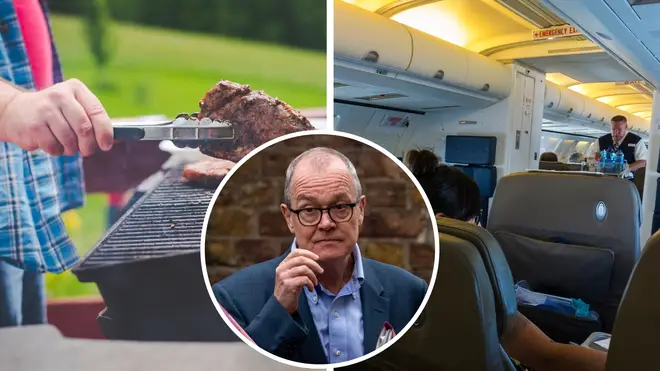
Matthew Wright 7am - 10am
28 October 2021, 00:03 | Updated: 28 October 2021, 01:33

Tackling the climate crisis will require changes such as eating less meat and flying less, the UK's chief scientific adviser has warned.
Sir Patrick Vallance made the comment as part of a joint statement with senior scientific advisers from around the world, ahead of the COP26 climate summit.
He called on leaders to take urgent action in limiting warming to 1.5C, before more extreme consequences of climate change begin to take effect.
The statement, signed by nearly 40 chief scientists and equivalents said it was still possible to curb temperature rises, but only with steep reductions in global emissions by 2030 and reducing them to zero overall by 2050.
In doing so, it would stabilise extreme weather conditions - such as flooding and wild fires - that have engulfed countries across the world.
Read more: Glasgow facing 'public health crisis' with bin workers due to strike during COP26
Read more: Eco activist dressed as Boris burns boat outside COP26 venue in fossil fuel protest

David Lammy clashes with caller who insists COP26 'doesn't have power'
Sir Patrick said the message to world leaders is that "1.5C is achievable, it's absolutely what we should be aiming for" but it requires action now.
He said this decade is the decade of research and development of innovation, but it has to be scaled and applied now or the world will not be able to reach the temperature target.
"It's going to require detailed plans, it's going to require technology, it's going to require behavioural change and it's going to require monitoring in order to achieve this, including monitoring of emissions."
On behavioural changes, Sir Patrick said: "There will be a move away from the extent of meat eating we've seen in the past, and I think we will all need to think about our flying habits.
"But of course, coupled to that, there's also technological advances, so as options for green transport become real that will change again.
"One of the climate challenge is it's a series of small things from all of us that turn into a big change.
"Those little things that appear like they're not very much are important when they are aggregated across many many millions of people."
Read more: How will COP26 be carbon neutral?
Read more: What is COP26 and why does it matter? A complete guide to the key climate summit
The advisers said addressing climate change would require intense international collaboration on research and innovation to develop and deliver new solutions across all sectors of the global economy.
Action to adapt to the consequences of climate change that are already inevitable "is critical", they warned, suggesting it "will require rapid, urgent and sustained action and significant behavioural, socioeconomic and technological transformations across the world".
"This must begin with rapid scale-up and deployment of a wide range of existing and novel technological solutions," the statement said.

Boris Johnson: 'Cop26 is a turning point for the world'
Sir Patrick added that most of the technologies needed to shift to a greener world were already "visible", warning against relying on a "magic new technology" coming along in future years to solve the problem.
The "green choice needs to be the easy choice" for people, including on price, convenience and with a clear understanding of what they can do on an individual level to make a difference, Sir Patrick explained.